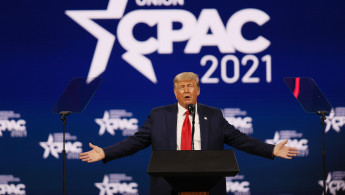Seeking relevance and taking aim at Biden, ex-President Trump touts Middle East 'victories' at CPAC
Four years later, at last week's annual Conservative Political Action Conference (CPAC) in Orlando, Florida, speakers touted what they considered key policy 'victories' achieved by Trump in the Middle East – from preventing travel from 'terrorist countries' to nearly ending America's "forever wars" to "historic peace deals" in the region.
Trump himself was the star speaker at CPAC, where he made his first major appearance since he lost the election to Joe Biden.
"Within his first few hours, Biden eliminated our national security bans on nations plagued by terrorism. His first priority was to open our borders to unvetted travelers from Libya, Yemen, Syria, Somalia, and many other countries where strict vetting cannot occur," said Trump about half an hour into his keynote speech, whose main theme was to criticise President Joe Biden's new policies, many of which are indeed designed to undo those implemented by the previous administration (Fact check: refugees still have to undergo a strict vetting process that takes between one and two years, considered among the most difficult ways to enter the United States).
Trump then went on to make the case that he had practically eliminated America's 'forever wars' – a promise he had made on the campaign trail. And it was one of his key criticisms of his opponents while running for office, first in the Republican primary which helped eliminate early hopeful Jeb Bush (brother of George W. Bush, who ordered the US invasion of Iraq over unproven allegations of weapons of mass destruction), and then against his general election opponent Hillary Clinton, who as a New York senator had voted in favour of the Iraq war.
"When I left office, we had virtually ended the endless wars. These endless wars, they go on forever. They go on forever. I would go to Dover, and I would see caskets, coffins coming in. I would see parents, wives, husbands. I would see the kids. Endless wars. Nineteen years in Afghanistan. We have it down to almost nothing left, and I hear that they might want to go back in," Trump told the CPAC audience.
Echoeing his father, Donald Trump Jr. at CPAC also condemned Biden for this recent bombing of military installations in Syria, although Trump had ordered several strikes in Syria and Iraq while in office.
 |
Trump did tap into and address long-held grievances of many Americans about the Middle East but he did so in a way that lacked sufficient depth |  |
A muddled legacy in the Middle East
Though Trump did draw down the US troop presence in Iraq and Afghanistan shortly before leaving office (acting against his advisers' counsel), more than 2,500 still remain in both countries.
His quick withdrawal of US forces in northern Syria in 2019 was also widely criticised for its hastiness and for what was considered a 'betrayal' of America's Kurdish allies.
Moreover, his withdrawal from the Iran nuclear deal, which he touted in his speech, combined with his increased closeness with Arab Gulf countries, raised concerns of hindering America's potential to rein in Iran's nuclear ambitions and addressing human rights abuses in the Gulf.
Continuing in his speech's theme of safety and peace, Trump touted his administration's "peace deals" in the Middle East, mainly between countries not at war.
"We made historic peace deals in the Middle East, like nobody thought were even possible, with not a drop of bloodshed," claimed Trump, to a standing ovation.
The Abraham Accords, which lifted restrictions between Israel and the United Arab Emirates, Bahrain, and subsequently Sudan and Morocco, generally normalised relations between countries that were not actually in conflict. In the case of Morocco, America agreed divisively to recognise its claim to the disputed Western Sahara in exchange for opening up to Israel, undermining its own position as honest broker in that dispute. These deals, combined with the US moving its embassy from Tel Aviv to Jerusalem, will likely make it challenging for subsequent administrations to gain credibility among those that were not favoured.
In the end, Trump did tap into and address long-held grievances of many Americans: national security, reducing troops overseas, and trying to make peace in the Middle East. But critics have said that he did so in a way that lacked sufficient depth or understanding of these objectives, at least in the long term.
"When the Abraham accords came out, the 'deal of the century,' I did my duty and read them," said Ronald Stockton, a professor of political science at the University of Michigan-Dearborn. "I said to my students: I'm not going to waste your time summarising this. There's no value in this."
He pointed out how Biden waited nearly a month into his administration to call Israeli Prime Minister Benjamin Netanyahu, as well as his promises to reenter the Iran nuclear deal as evidence of a drastically different approach to the region, from Afghanistan to Iran, the Gulf and Israel-Palestine.
"The contrast with Biden," he believes, "is going to be dramatic".



